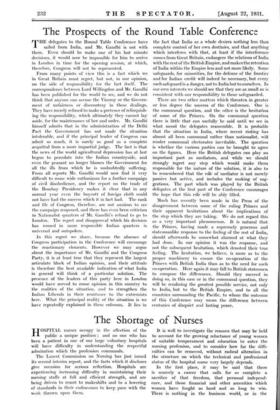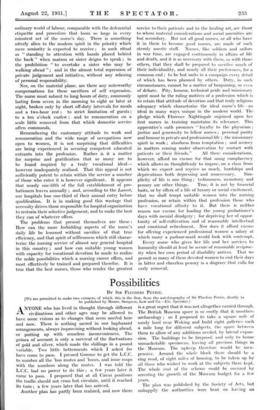The Shortage of Nurses
HOSPITAL nurses occupy in the affection of the public a unique position ; and no one who has been a patient in one of our large voluntary hospitals will have difficulty in understanding the respectful admiration which the profession commands.
The Lancet Commission on Nursing has just issued its second interim report, and the facts which it discloses give occasion for serious reflection. Hospitals are experiencing increasing difficulty in maintaining their nursing staffs at full and efficient, strength, and are being driven to resort to makeshifts and to a lowering of standards in their endeavours to keep pace with the work thrown upon them. It is well to investigate the reasons that may be held to account for the growing reluctance of young women of suitable temperament and education to enter the nursing profession, and to consider how far the diffi- culties can be removed, without radical alteration in the structure on which the technical and professional status of the hospital nurse very largely depends.
In the first place, it may be said that there is scarcely a career that calls for so complete a sacrifice of that freedom, that personal independ- ence, and those financial and other amenities which women have fought so hard and so long to win. There is nothing in the business world, or in the ordinary world of labour, comparable with the deferential etiquette and procedure that loom so large in every minutest act of the nurse's day. There is something utterly alien to the modem spirit in the priority which mere seniority is expected to receive ; in such ritual as " standing to attention with hands placed behind the back " when matron or sister deigns to speak ; in the prohibition " to overtake a sister who may be walking ahead " ; and in the almost total repression of private judgement and initiative, without any relaxing of personal responsibility.
Nor, on the material plane, are there any noteworthy compensations for these sacrifices of self expression. The nurse must submit to long hours of duty, commonly lasting from seven in the morning to eight or later at night, broken only by short off-duty intervals for meals and a two-hour rest ; to strict limitation of guests ; to a ten o'clock curfew ; and to remuneration on a scale little removed from that which domestic service often commands.
Remembering the customary attitude to work and remuneration and the wide range of occupations now open to women, it is not surprising that difficulties are being experienced in securing competent educated entrants into the profession. Rather is it a matter for surprise and gratification that so many are to be found inspired by a truly vocational ideal— however inadequately realized. That this appeal is not sufficiently potent to retain within the service a number of those who enter it is however significant. It appears that nearly one-fifth of the full establishment of pro- bationers leaves annually ; and, according to the Lancet, our hospitals lose one-third of their annual entry before qualification. It is in making good this wastage that necessity drives those responsible for hospital organization to restrain their selective judgement, and to make the best they can of whatever offers.
The problems that present themselves are these : How can the more forbidding aspects of the nurse's daily life be lessened without sacrifice of that true efficiency, and that spirit of selflessness which still charac- terize the nursing service of almost any general hospital in this country ; and how can suitable young women with capacity for vocational devotion be made to realize the noble possibilities which a nursing career offers, and most effectively be trained and prepared therefor. It is true that the best nurses, those who render the greatest service to their patients and to the healing art, are those to whom material considerations and social amenities are but secondary. But not all good nurses, or all who have it in them to become good nurses, arc made of such sternly ascetic stuff. Nurses,' like soldiers and sailors in war time, are engaged continuously in affairs of life and death, and it is as necessary with them, as with those others, that they shall be prepared to sacrifice much of their individuality, and nearly all their preferences, for a common end ; to be but units in a campaign every detail of which has been planned by others. Duty, in such circumstances, cannot be a matter of bargaining, or even of debate. Pity, honour, technical pride and missionary spirit must be the ruling motives of a profession which is to retain that attitude of devotion and that truly religious adequacy which characterize the ideal nurse's life—an ideal in many ways unique in the modern world. The pledge which Florence Nightingale enjoined upon her first nurses in training maintains its relevance. This apprentice's oath promises " loyalty to the physician ; justice and generosity to fellow nurses ; personal purity and honour in private and professional life ; the missionary spirit in work ; aloofness from temptation ; and secrecy in matters coming under observation by contact with patients or their friends." All these considerations, however, afford no excuse for that smug complacency which allows us thoughtlessly to impose, on a class from which we expect and receive so much, hardships and deprivations both depressing and unnecessary. Sim- plicity of life is one thing ; tediousness, monotony and penury are other things. True, it is not by financial baits, or by offers of a life of luxury or social excitement, that we shall tempt suitable women into the nursing profession, or retain within that profession those who have vocational affinity to it. But there is neither reason nor excuse for loading the young probationer's days with menial drudgery ; for depriving her of oppor- tunity of self-cultivation and of reasonable intellectual and emotional refreshment. Nor does it afford excuse for offering experienced professional women a salary at which many a parlour-maid would look with contempt.
Every nurse who gives her life and her services to humanity should at least be secure of reasonable reciproc- ity when her own period of disability arrives. That we permit so many of these devoted women to end their days in bitter and cheerless penury is a disgrace that calls for early removal.































 Previous page
Previous page